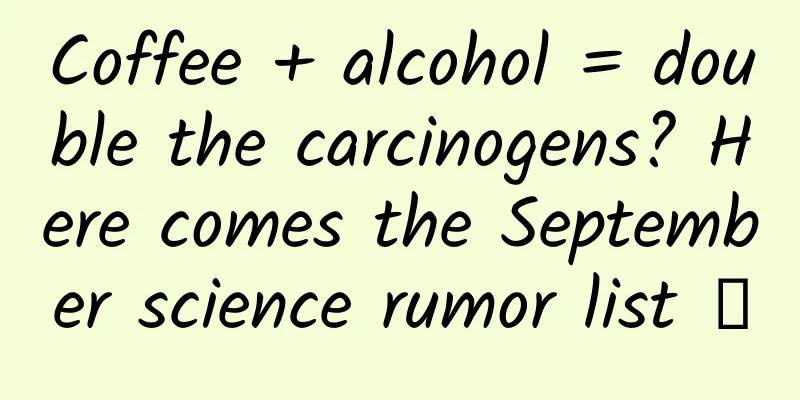Coffee + alcohol = double the carcinogens? Here comes the September science rumor list →

|
1. If you use "traditional remedies" such as applying soy sauce or toothpaste to treat a burn, will the wound heal faster? Rumor content: If you get burned, apply soy sauce and some toothpaste on the wound. These "traditional remedies" are very effective in treating burns. Truth interpretation: This practice can easily irritate the injured area and cause pain, and may even cause infection, affecting wound healing. When you encounter scalds and burns, the correct first aid method is the five-step method of "rinsing, stripping, soaking, covering, and sending ". That is, the first step is to rinse with tap water for 15-20 minutes to cool down; the second step is to strip, carefully take off clothes to avoid breaking the blister skin (you can also cut the clothes directly); the third step is to soak with cold water to relieve pain; the fourth step is to cover, cover the wound with clean dressings or clothes; the fifth step is to send the patient to the doctor for treatment quickly. During the healing process of burns, you must change the dressing according to the doctor's instructions, and never apply medicine randomly based on folk remedies. Source: Science Popularization China, Science Refutes Rumors 2. Is eating ginger at night like arsenic ? Rumor content: “Eating ginger in the morning is like ginseng soup, and eating ginger at night is like arsenic.” Ginger is a spicy food that speeds up blood circulation in the human body. Eating ginger at night is like eating poison. Truth interpretation: The saying that ginger soup at night is as strong as arsenic is too exaggerated. It is okay to consume it in moderation, but consuming it in large quantities may affect your sleep. Ginger is rich in nutrients such as capsaicin volatile oil, cellulose, and contains a variety of amino acids, vitamins, and trace elements. Gingerol has a good effect of scavenging free radicals, and gingerene and gingerone have a significant effect of inhibiting vomiting. Therefore, ginger is not only a seasoning, but also beneficial to human health. However, gingerol has a stimulating effect on the human heart and blood vessels, which can accelerate the heartbeat and dilate blood vessels. If you eat too much at night, you may feel mentally excited, which will affect your sleep. However, it is not so serious that "eating ginger at night is equivalent to eating arsenic", so you don't have to worry too much. Eating a small amount of it at dinner will not have much impact, just don't eat too much. Source: Science Refutes Rumors 3. Coffee + alcohol = double the carcinogens ? Rumor content: Coffee contains carcinogens, and alcohol is also a carcinogen. Therefore, the combination of "coffee + alcohol" is doubly carcinogenic and it is best not to drink it. Truth interpretation: The claim that "coffee causes cancer" is mainly because acrylamide, a Class 2A carcinogen, is produced when roasting coffee beans. But acrylamide is not unique to coffee beans. As long as food is fried or roasted (containing carbohydrates and proteins) at high temperatures, a certain amount of acrylamide will be produced. Although acrylamide is a Class 2A carcinogen, the carcinogenic risk of acrylamide in humans is still controversial and the conclusion is not clear. Even if it is found to be carcinogenic in animal experiments, it requires long-term and large-scale intake. Converted to coffee, you would have to drink dozens of cups a day to have a risk of cancer, so there is no need to worry too much. "Coffee and alcohol can cause cancer" mainly refers to the alcohol in the drink. The amount of alcohol and the risk of cancer are significantly positively correlated. From the perspective of cancer prevention, it is recommended that everyone not drink alcohol at all. However, if the alcohol content is very low, the risk is actually not very great. Take the recently popular sauce-flavored latte as an example. According to the brand's publicity, the alcohol content is less than 0.5%, and is said to be between 0.2 and 0.3 degrees. Based on this calculation, the alcohol content in each cup of latte is about 2 ml. According to official US recommendations, women should not drink more than one serving of alcohol (18 ml) a day, and men should not drink more than two servings (36 ml), which is roughly equivalent to the alcohol content of 9 or 18 cups of sauce-flavored lattes. Even if you love coffee, it is difficult for anyone to drink this amount every day , so there is no need to worry that drinking coffee with alcohol will double the risk of cancer. Source: WeChat public account Pineapple Factor 4. When having an epileptic seizure, should you immediately cover your mouth with something? Rumor content: When an epileptic patient has an attack, in order to avoid biting the tongue, they should put something in their mouth to avoid biting themselves. Truth interpretation: This practice is unscientific and may cause suffocation and endanger the patient's life . Because hard objects stuffed in the mouth may scratch the mouth and cause bleeding, and the blood coagulation that enters the respiratory tract may cause breathing difficulties. If the object stuffed in the mouth is bitten, it is also dangerous if the fragments enter the respiratory tract. The correct approach is to let the patient lie on his side, slightly raise the patient's head with soft items such as clothing, stay with the patient, wait, observe and time the patient. Usually the patient's symptoms will be relieved within 1-2 minutes. If there is no relief after 5 minutes or the patient is still unconscious after the convulsion stops, call for emergency help immediately. Source: Science Popularization China 5. Can long-term constipation lead to rectal cancer? Rumor content: Long-term constipation means that the stool cannot be excreted and the toxins in the stool cannot be excreted. The harmful substances in the stool are in contact with the colon mucosa for a long time, which can cause rectal cancer. Truth interpretation: Constipation is not a high-risk factor for rectal cancer. Studies have shown that the incidence of rectal cancer in people with long-term constipation is not higher than that in people without constipation. After rectal cancer, as the disease progresses, patients will experience difficulty defecating or changes in bowel habits. For example, blood in the stool, increased frequency of bowel movements, thinner stools, alternating diarrhea and constipation, etc. It can be seen that constipation is one of the clinical manifestations of rectal cancer , but this does not mean that constipation will induce rectal cancer. Although constipation does not increase the risk of colorectal cancer, long-term constipation may be the intestines' cry for help. If there are persistent changes in bowel habits, constipation, or abnormally colored stools, it is recommended to seek medical attention in a timely manner. Source: Science Refutes Rumors 6. In case of cardiac arrest, is it effective to raise the legs to rescue? Rumor content: When someone falls to the ground, is unconscious, does not respond to calls, and is silent, quickly lay the patient's upper body flat and lift the patient's legs to between 45 degrees and 90 degrees. The patient will wake up in about 1 minute. Truth interpretation: This statement is incorrect. If someone suffers cardiac arrest, the correct first aid method is to perform cardiopulmonary resuscitation immediately. For cardiac arrest, all rescue methods are aimed at quickly establishing temporary artificial circulation and artificial respiration to ensure that the blood and oxygen supply to the vital organs of the person being rescued is not interrupted for too long. This process must be done every second, otherwise brain damage may occur. Lifting the legs will not obviously help and will delay the rescue opportunity. Therefore, the patient should be given cardiopulmonary resuscitation promptly, using a defibrillator if necessary, rather than leg lifting. Source: Science Popularization China About the Science Rumors List Released by the China Association for Science and Technology, the list is reviewed by experts every month. Based on criteria such as timeliness and harmfulness, hot rumors are selected for special interpretation and pushed across the entire network. Jointly published: Scientific rumor-busting platform, China Internet Joint Rumor-busting Platform, "Study to Strengthen the Country" learning platform Supported platforms: Weibo rumor refutation, Toutiao rumor refutation, Tencent Jiuzhen, NetEase Health, Toutiao Health, Baidu Knows, Douyin Scientific rumor debunking: Sponsored by the China Association for Science and Technology, the National Health Commission, the Ministry of Emergency Management, the State Administration for Market Regulation and other ministries and commissions, guided by the Central Cyberspace Affairs Commission, and jointly created by national societies, authoritative media, social organizations and scientific and technological workers, it aims to effectively improve the dissemination, guidance and influence of rumor debunking information, so that rumors can stop at the wise and let science outrun rumors. List of review experts (In order of the number of strokes of surname) Wang Qian, Chief Physician of the Emergency Department, the Third Medical Center, PLA General Hospital Zhang Yu, Deputy Director of the Office of the Institute of Nutrition and Health, Chinese Center for Disease Control and Prevention Chen Peng, Associate Professor, Department of Communication, Nankai University Gao Chao, Associate Researcher, Institute of Nutrition and Health, Chinese Center for Disease Control and Prevention Han Hongwei, Researcher at the National Food Safety Risk Assessment Center |
Recommend
9 cases and 12 methods to obtain seed users
Regarding seed users , there are several concepts...
App Delivery Growth: Introduction to Attribution Models and Frameworks
The advertising industry has always had a famous ...
Strong carcinogenicity! Don't eat this kind of fruit
Expert of this article: Wang Xiaohuan, Doctor of ...
Here are 6 headline tips to easily boost readership (you’ll learn it at a glance)
Regarding the title , someone always tells me, &q...
Inside story of Roadstar palace fighting: There was internal strife long ago, and the CTO was publicly "dismissed" when participating in an overseas exhibition
From left to right: Zhou Guang, Tong Xianqiao, He...
How to get the approval of senior management for SEO implementation plan?
As an SEO for a large company, the most difficult...
Why is it that dumplings are an indispensable part of every northern Chinese New Year meal?
Audit expert: Wang Guoyi Postdoctoral fellow in N...
Huang Qianxuan's 12 practical dressing tips to make your boyfriend fall in love with you at first sight
Huang Qianxuan's 12 practical dressing tips t...
Old Wang from the west of the village "2022 Sideline Banknote Printing Society"
Lao Wang from the west of the village "2022 ...
The discovery of the Zhenghe Bamin bird rewrites the history of bird evolution
A bird that lived in Fujian 150 million years ago...
How to wear an N95 mask? How long can an N95 mask be worn at a time?
Masks are being snatched up everywhere, manufactu...
iPad5 and iPad4 are very different, most users are willing to upgrade
[September 9 news] It is estimated that many neti...
How does the Grand Canal, Beijing-Hangzhou, carry half of the history of Chinese civilization?
When "Dream of Splendor" was aired, man...
“Jump Jump” is popular, how can brands leverage this momentum for marketing?
The WeChat mini -game “Jump Jump” has become very...
Swift Practice: Using CoreData to Complete an Address Book Storage
As Apple's own child, CoreData still plays an...









